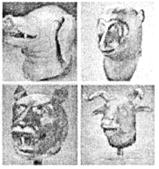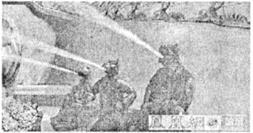
题目列表(包括答案和解析)
Recently a Beijing father sent in a question at an Internet forum(论坛) asking what “PK” meant.
“My family has been watching the ‘I Am the Singer’ singing competition TV program. My little daughter asked me what ‘PK’ meant, but I had no idea,” explained the puzzled father.
To a lot of Chinese young people who have been playing games online, it is impossible not to know this term. In such Internet games, “PK” is short for “Player Kill”, in which two players fight until one ends the life of the other.
In the case of the “I Am the Singer” singing competition, “PK” was used to refer to the stage where two singers have to compete with each other for only one chance to go up in competition raking.
Like this father, Chinese teachers at Middle schools have also been finding their students using Internet jargons which are difficult to understand. A teacher from Tianjin asked her students to write the compositions with simple language, but they came up with a lot of Internet jargons that she didn’t understand.
“My ‘GG’ came back this summer from college. He told me I’ve grown up to be a ‘PLMM’. I loved to ‘FB’ with him together; he always took me to the ‘KPM’,” went one composition.
“GG” means Ge Ge (Chinese pinyin for brother). “PLMM” is Piao Liang Mei Mei (beautiful girl). “FB” means Fu Bai (corruption). “KPM” is short for KFC, Pizza Hut and McDonald’s.
Some specialists welcome Internet jargons as a new development in language. If you do not even know what a Kong Long (dinosaur, meaning an ugly looking female) or a Qing Wa (frog, meaning an ugly looking male ) is, you will possibly be regarded as a Cai Niao!
【小题1】By writing the article, the writer tries to _________.
A. explain some Internet jargons
B. suggest common Internet jargons
C. draw our attention to Internet jargons
【小题2】What does the underlined word Internet jargons mean?
A. Internet language
B. Internet action
C. Internet fashion
【小题3】What does the writer think about the word “PK”?
A. Fathers can’t possibly know it.
B. The daughter should understand it.
C. Online game players may know it.
【小题4】The example of the Beijing father and the Tianjin teacher are used to show that Internet jargons__________.
A. are used not only online
B. cause trouble to our mother tongue
C. are welcomed by all the people
【小题5】What would be the best title for the passage?
A. A Puzzled Father!
B. Do You Speak Internet English?
C. Kong Long or Qing Wa?
Recently a Beijing father sent in a question at an Internet forum(论坛) asking what “PK”meant.
“My family has been watching the ‘I Am the Singer’ singing competition TV programme. My little daughter asked me what ‘PK’ meant, but I had no idea,” explained the puzzled father.
To a lot of Chinese young people who have been playing games online, it is impossible not to know this term. In such Internet games, “PK” is short for “Player Kill”, in which two players fight until one ends the life of the other.
In the case of the “I Am the Singer”singing competition, “PK” was used to refer to the stage where two singers have to compete with each other for only one chance to go up in competition raking.
Like this father, Chinese teachers at Middle schools have also been finding their students using Internet jargons which are difficult to understand. A teacher from Tianjin asked her students to write the compositions with simple language, but they came up with a lot of Internet jargons that she didn’t understand.
“My ‘GG’ came back this summer from college. He told me I’ve grown up to be a ‘PLMM’. I loved to ‘FB’ with him together; he always took me to the ‘KPM’,” went one composition.
“GG” means Ge Ge (Chinese pinyin for brother). “PLMM” is Piao Liang Mei Mei (beautiful girl). “FB” means Fu Bai (corruption). “KPM” is short for KFC, Pizza Hut and McDonald’s.
Some specialists welcome Internet jargons as a new development in language.If you do not even know what a Kong Long (dinosaur, meaning an ugly looking femal) or a Qing Wa (frog, meaning an ugly looking male ) is, you will possibly be regarded as a Cai Niao!
76.By writing the article, the writer tries to _________.
A.explain some Internet jargons B.suggest common Internet jargons
C.laugh at the Beijing father D.draw our attention to Internet jargons
77.What does the underlined word Internet jargons mean?
A.Internet language B.Internet action C.Internet behavior D.Internet fashion
78.What does the writer think about the word “PK”?
A.Fathers can’t possibly know it. B.The daughter should understand it.
C.Online game players may know it. D. “I Am the Singer” shouldn’t have used it.
79.The example of the Beijing father and the Tianjin teacher are used to show that Internet jargons__________.
A.are used not only online B.can be understood very well
C.are welcomed by all the people D.cause trouble to our mother tongue
80.What would be the best title for the passage?
A. A Puzzled Father! B.Do You Speak Internet English?
C.Keep away from Internet English! D.Kong Long or Qing Wa?
There were 12 bronze (青铜) animal heads at the European style (风格) in Old Summer Palace
(Yuanmingyuan)-Rat, Ox, Tiger, Rabbit, Dragon, Snake, Horse, Sheep, Monkey, Rooster, Dog, and Pig.
They were made into fountain (喷泉) and would take turns spouting water every two hours to tell time.

But the heads were looted (抢) by French and British soldiers in 1860 during the Second Opium War
(鸦片战争).

Until now, Pig, Ox, Monkey, Tiger and Horse have returned to China. But Rat and Rabbit beads were
auctioned (拍卖) for $17.92 million each. Luckily, Cat Mingchao, a Chinese collector won the auction,
but he said he would not pay the money. Why? He said they were looted from China and he is a Chinese.
"We will use international and Chinese laws to get the two beads to return to China in all necessary ways,"
said Ouyang. However, there are still five bronze heads (Dragon, Snake, Sheep, Rooster, Dog) are unknown
now.
An online survey, by Le Figaro newspaper, showed that more than 80 percent people said the bronze heads
should be returned to China, the Europe Daily reported on Wednesday. We should understand why they want
the two bronzes back…Just think about how they came to France.
There were 12 bronze(青铜)animal heads at the European style(风格)in Old Summer Palace (Yuanmingyuan)-Rat,Ox,Tiger, Rabbit,Dragon,Snake,Horse,Sheep,Monkey, Rooster, Dog,and Pig.They were made into fountain(喷泉)and would take turns spouting water every two hours to tell time.

But the heads were looted(抢) by French and British soldiers in 1860 during the Second Opium War(鸦片战争).

Until now,Pig,Ox,Monkey,Tiger and Horse have returned to China.But Rat and Rabbit beads were auctioned(拍卖)for $17.92 million each.Luckily,Cat Mingchao,a Chinese collector won the auction,but he said he would not pay the money.Why? He said they were looted from China and he is a Chinese.”We will use international and Chinese laws to get the two beads to return to China in all necessary ways,”said Ouyang.However,there are still five bronze heads(Dragon,Snake,Sheep,Rooster,Dog)are unknown now.
An online survey,by Le Figaro newspaper,showed that more than 80 percent people said the bronze heads should be returned to China,the Europe Daily reported on Wednesday.We should understand why they want the two bronzes back…Just think about how they came to France.
1.__________people think that the bronze heads should be returned to China in the online survey.
A.Most B.Few C.Half of people D.All
2.What does the word spouting mean in Chinese?
A.喷 B.鸣唱 C.制造 D.凝固
3.How did the Rat and Rabbit heads go to France?
A.They were looted by Americans.
B.They were sold to France by an auction in 1860.
C.The Qing Dynasty gave them as presents.
D.They were looted by French and British soldiers in the Second Opium War.
4.Cai Mingchao is a Chinese who __________.
A.won the auction that the Rat and Rabbit heads were auctioned
B.made the 12 bronze animal heads
C.bought the heads to China
D.made the online survey
湖北省互联网违法和不良信息举报平台 | 网上有害信息举报专区 | 电信诈骗举报专区 | 涉历史虚无主义有害信息举报专区 | 涉企侵权举报专区
违法和不良信息举报电话:027-86699610 举报邮箱:58377363@163.com